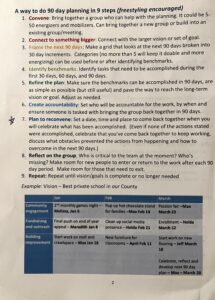Max Gimbel, from the Ford Family Foundation, recently shared planning strategies with Applegaters.
by Christina Ammon
Last Thursday, I attended an event the Ruch library and was surprised when a poem suddenly came to mind. Poetry felt distinctly non-sequitur. Afterall, the presentation, sponsored by A Greater Applegate, was titled “90-Day Action Planning in 90-Minutes.” It was about logistical matters– not poetry.
The presenter, Max Gimbel, clicked through slides that depicted goal-setting strategies. The 30-60-90 Day technique, he explained, is a way to realize long-term visions by setting near-term benchmarks.
During the slideshow, the first line of a David Whyte poem sang in my mind.
Start close in.
Max is part of the Rural Community Building Department at The Ford Family Foundation–an organization which provides grants to Oregon and Siskiyou County. His visit to the Applegate was the last in a three-part series of workshops offered for free to the public. The first one was “Community Building 101” and the second was about group decision-making.
His next slide: A pizza slice. Max stressed the importance of breaking large projects down into smaller pieces. In this case, into 30-day, 60-day and 90-day benchmarks. Approaching projects in this way has multiple benefits. For one, it makes large, unwieldy projects feel manageable. It also makes it easier to enlist helpers, allows for flexibility, provides small victories and lends work a steady rhythm.
The poem, again.
Start close in
Don’t take the second step, or the third
Start with the first thing
Close in.
From pizza to poetry. Strange. Or maybe not so strange. David Whyte has appealed to corporations and nonprofits worldwide for the way he translates the practical matters of life into poetry—and vice-versa. His work with organizations has probably made him the highest paid poet in the world–if not in all of human history.

90 day planning in 9 steps. Max Gimbel provided this helpful worksheet during the presentation.
I’d never considered that his poem, Start Close In, contained wisdom I could apply to my planner. I thought of friends who made their planners visually beautiful, incorporating colors and imagery. Come to think of it, planning was a kind of art.
Start with the first thing, close in
The step you don’t want to take
The step you don’t want to take? Maybe Whyte was referring to the tremendous amount of self-belief and faith it takes to initiate a new project. Self-belief combined with overcoming the inertia of taking those first, often-mundane and inglorious first steps: assembling supplies, making the phone calls, doing the groundwork. In this sense, the 30-60-90 day roadmap felt like a remedy in the way it tied the little steps to the big picture.
 Community members were then invited to fill out a worksheet and draft an approach to a current project. Thalia Truesdell was working with kids on selling a coloring book they made about Cantrall-Buckley Park.
Community members were then invited to fill out a worksheet and draft an approach to a current project. Thalia Truesdell was working with kids on selling a coloring book they made about Cantrall-Buckley Park.
Miranda Caroligne, from the Miner’s Bazaar, zoomed into the meeting wanting to implement at consistent workshop schedule at the popular Jacksonville project café.
Seth Kaplan, Co-Executive Director for A Greater Applegate, was at the workshop, too. In relation to enlisting help and funding for projects, he said, “It’s more persuasive to hear a 90-day plan, versus just an idea.”
True, the 30-60-90 day approach isn’t revolutionary. “People have been doing quarterly planning for ages,” said Max. Still, it was great to be guided through it.
“Just jotting an outline down was helpful,” Truesdell said. “I had it in my mind, but seeing it on paper makes it feel like it will work.”
Thank you Max Gimbel and A Greater Applegate!
And here’s a link to the rest of the David Whyte poem, which isn’t perfectly relevant, but a nice poem nonetheless.
Happy planning!

